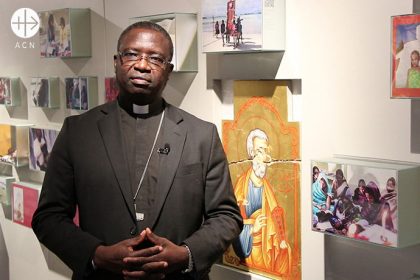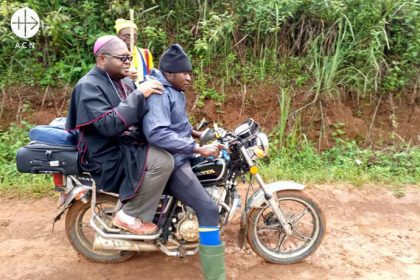At present, the Anglophone areas of Cameroon are being constantly shaken by a conflict between Anglophone separatist groups and the Francophone central government. In this context of fratricidal conflict, the Church is attempting to rekindle dialogue between the two parties. Bishop Emmanuel Abbo of Ngaoundéré, in the Francophone area, who is 49, and Auxiliary Bishop Michael Bibi of Bamenda, in the Anglophone area, talk about the situation in their country with Aid to the Church in Need (ACN).
ACN: “Are we talking about ‘civil war’ in the Anglophone areas?
Bishop Michael Bibi: The elections in October 2018 should have enabled the people of this region to express themselves democratically via the ballot box. But in reality, the situation is more complicated than that, since there are a great many internally displaced people and very few Cameronian’s were able to vote in practice. Unfortunately, the conditions for a peaceful exercise in democracy are not established. And yet it is only through a candid and inclusive dialogue that we will be able to emerge from this crisis. But for the time being, the only voices urging this are the religious leaders!
Bishop Emmanuel Abbo: I am not on the spot, but the news that reaches us is not reassuring. We receive widely differing information, so it is difficult to speak objectively.

Mgr. Emmanuel Abbo, Bishop of N’Gaoundere, Cameroon, visited in January the Headquarters of ACN.
ACN: On several occasions the Church in Cameroon has sounded the alarm, alerting us to the situation of the priests and religious living in the Anglophone areas. What kind of role is the Church able to play?
Bishop Michael Bibi: The Church is on the front line. A priest and a seminarian have both been murdered in the Anglophone region. In the case of the latter, it was a deliberate execution, staged in front of his church in the presence of the parishioners. And sadly, these two are not simply isolated cases. I receive alarming news from many priests and religious who have been shot at or kidnapped and ransomed. I myself have been arrested, but they let me go again after a few hours.
I can bear witness to the fact that the clergy who stay on in the Anglophone area are particularly under threat. We speak the truth. We tell the young people to stay in school and not join the militias, that it will lead to nothing – and so the militias accuse us of playing the government’s game for them. But we also denounce the actions of the government army and call for the region to be demilitarised – and so all of a sudden we are accused by the authorities of siding with the rebels! The truth we speak is not welcome in the midst of this fratricidal conflict. The truth is that both sides are involved in the killing and are only adding violence to violence.

Mgr. Michael Miabesue Bibi, Auxiliary Bishop of the Archdiocese of Bamenda (Cameroon) visited the headquarters of ACN in Königstein in January.
Bishop Emmanuel Abbo: The Church is playing her part in resolving conflicts and upholding the peace. The bishops’ conference is taking initiatives, but we prefer the path of quiet diplomacy, talking directly to the parties in the conflict since too much media attention risks undermining the success of these initiatives.
ACN: How is the Church faring in your country?
Bishop Michael Bibi: Thanks be to God, the Cameroonian people have a strong faith. They attend Sunday Mass with real fervor, and we have a number of priestly vocations. What is needed now is for our political leaders to be likewise illuminated by this faith.
Bishop Emmanuel Abbo: My diocese was evangelized barely 60 years ago. The Oblates of Mary Immaculate, a congregation of French origin, arrived here in the 1950s. There are three factors that give me hope: I have a cohort of priests in my diocese who are very young, very dynamic and with whom I enjoy an excellent collaboration; then we have the presence of the religious congregations, who share our pastoral concerns; and finally, despite the widespread poverty, we have the Catholic faithful who are willing to do whatever they can to help our Church move forward.
We are facing enormous challenges. On the pastoral level, the diocese does not have enough priests – that is why I have appealed for fidei donum priests to come – nor does it have enough human and material resources. In the social sphere, we would like to be able to rebuild our schools and health centers in solid materials. And in the development field ,we would like to be able to support our people, who are extremely poor, in organising associations or cooperatives. And one of our priorities in the pastoral field is the construction of a diocesan pastoral centre where we can hold our formation sessions which we would like to organise for our 343 catechists and 57 priests.
ACN: Would you like to say something to our benefactors?
Bishop Michael Bibi: We need the prayers of ACN. And we also need practical help for the victims of the conflict in the Anglophone region, in line with the words of Jesus: “I was hungry, and you fed me, naked, and you clothed me.”
Bishop Emmanuel Abbo: I would like to thank them all for their generosity. They have been a huge support for us in our dioceses, and especially here in Cameroon, because ACN helps us greatly with our pastoral projects. And please redouble your generosity, because our problems and our concerns are continuing to grow.



